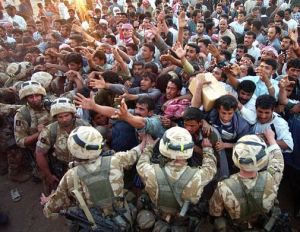Anne Anderson
 Psychologists for Social Responsibility has traditionally supported U.S. government policies that focus on the use of diplomacy, development aid, and psychosocially appropriate humanitarian assistance to support communities striving to sustain themselves. However, these days, it is difficult for the U.S. to pursue those kinds of policies even when we want to. The U.S. government over the years has dismantled its capacity to deliver such services through any civilian agency and is left, by default or by design, with using military forces to provide them.
Psychologists for Social Responsibility has traditionally supported U.S. government policies that focus on the use of diplomacy, development aid, and psychosocially appropriate humanitarian assistance to support communities striving to sustain themselves. However, these days, it is difficult for the U.S. to pursue those kinds of policies even when we want to. The U.S. government over the years has dismantled its capacity to deliver such services through any civilian agency and is left, by default or by design, with using military forces to provide them.
Currently, the State Department is in charge of coordinating stabilization and reconstruction activities. The Defense Department (DoD) is supposed to support civilian activities (U.S. agencies, NGOs, and international agencies) with stability operations. But the resources the military has available for these operations far exceeds those allotted to the State Department and the U.S. Agency for International Development. Indeed, between 2002 and 2005, the Pentagon’s share of U.S. official development assistance grew from 5.6% to 21.7%. And Directive 3000.05, under which the DoD is currently operating, calls for the military to carry out any tasks that the civilians are unable to do.
Furthermore, some in the military want to subsume stability operations under the category of Irregular Warfare, which would make it more difficult for the State Department and DoD to work together in the field. Any stabilization and reconstruction activities carried out by civilians would become part of DoD’s Irregular Warfare efforts, rather than DoD’s stability operations supporting civilian activities. The U.S. Congress is finally taking note of this situation, as are a number of Washington think tanks, but the issues often seem arcane and nuanced. Here are my primary concerns:
1. Foreign policy should be made with many complex and far-reaching perspectives taken into consideration. But if our democracy is to survive and thrive, foreign policy must be made by civilians and carried out by civilians, such as diplomats, international- development professionals, and humanitarian-assistance experts. Of course, the military plays a role in this process. One of the hallmarks of U.S. democracy, however, is civilian leadership of our military forces, not the other way around.
2. If we allow stability operations to be subsumed under the rubric of irregular warfare, we place ourselves in an impossible “Us & Them” position, even as we try to provide technical assistance such as conflict resolution programs or building schools. What failing state would be comfortable accepting such aid? And how would we work with international agencies and NGOs who must maintain a non-partisan position?
3. How well would U.S. military forces actually be able to carry out a complex community-building reconstruction process, when their basic training is not focused on these issues?
Here’s what I suggest we do to address these concerns:
• Ask Congress to exercise careful and vigilant oversight on the actual functioning of our agencies–both civilian and military–in the realm of foreign policy. With the current system, when civilian agencies are unable to fulfill their mandate the military is authorized to step in. When this happens, both military and civilian agencies lose. Soldiers are placed in untenable positions for which they have little or no training and poor outcomes are often the result. Civilian agencies are overstretched, so they fail in their mission because, despite their expertise, they have too few people to respond to all the needs of these critical times. Finally, fragile societies that may have been interested in our help–whether humanitarian aid, technical assistance, or any other aspect of stabilization and reconstruction–too often become disillusioned and more vulnerable to extremist thinking. And they may be less able to survive as viable communities in the future.
• Ask Congress to allocate more resources to civilian capacities. Congress must increase the funding of civilian agencies, particularly USAID and Department of State, if they are to function effectively in these critical times. Rather than depending more often on the military to do multiple tasks, we need to be able to call upon civilian agencies. We desperately need the skill sets of understanding different cultures, speaking different languages, being able to listen to others’ points of view and concerns, managing conflict nonviolently, and cooperating to reach superordinate goals. Providing more resources to these agencies can enhance our ability to build a more peaceful world.
NOTE. For more information, see Stewart Patrick & Kaysie Brown’s “The Pentagon and Development: Making Sense of the DoD’s Expanding Role”; Frida Berrigan’s “Entrenched, Embedded, and Here to Stay: The Pentagon’s Expansion Will Be Bush’s Lasting Legacy”; and Sam Smith’s “The Pentagon’s ‘Irregular Warfare’ Against Civilian Foreign Policy”.
PsySR member Anne Anderson, LICSW, is a social worker in private practice with the Washington Therapy Guild in Washington, DC. She served as PsySR’s Coordinator from 1984-2006. She can be reached at mobileanne@earthlink.net.
![blogs [at] psysr.org](https://psysr.files.wordpress.com/2008/12/blogemail.gif) (along with a few lines about yourself). We plan to add new essays regularly, so please check back often.
(along with a few lines about yourself). We plan to add new essays regularly, so please check back often.
Leave a comment